Comprehensive Garden Maintenance Services in Putney
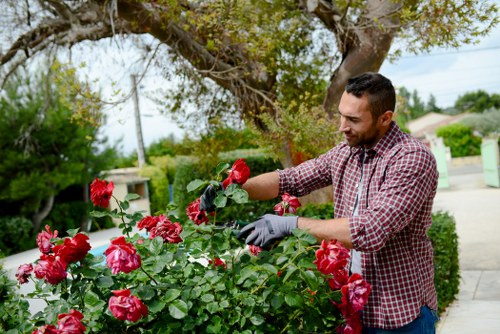
Introduction to Garden Maintenance in Putney
Maintaining a beautiful and healthy garden in Putney requires dedication, knowledge, and the right set of tools. Whether you're a seasoned gardener or a beginner, understanding the essential aspects of garden maintenance can transform your outdoor space into a vibrant and inviting haven.
Putney's unique climate and soil conditions demand tailored maintenance practices to ensure your garden thrives throughout the year. From seasonal tasks to regular upkeep, having a well-structured maintenance plan is key to achieving a flourishing garden.
In this article, we will explore the various aspects of garden maintenance in Putney, offering valuable tips and professional insights to help you maintain a picturesque garden that enhances your property's beauty and value.
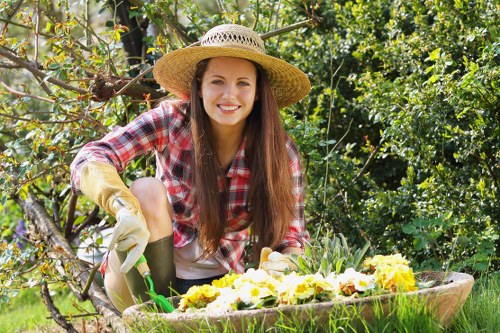
Essential Garden Maintenance Tasks
1. Regular Lawn Care
Keeping your lawn healthy starts with regular mowing, watering, and fertilizing. In Putney, it's important to adjust your lawn care routine based on seasonal changes to accommodate the local climate.
Seasonal Lawn Care Tips
- Spring: Aerate the soil and apply a balanced fertilizer to promote new growth.
- Summer: Ensure consistent watering, especially during dry spells, and mow regularly.
- Autumn: Rake fallen leaves and prepare the lawn for winter by applying a winterizer fertilizer.
- Winter: Minimize foot traffic on the lawn and protect it from frost damage.
Implementing these seasonal practices helps maintain a lush and resilient lawn year-round.
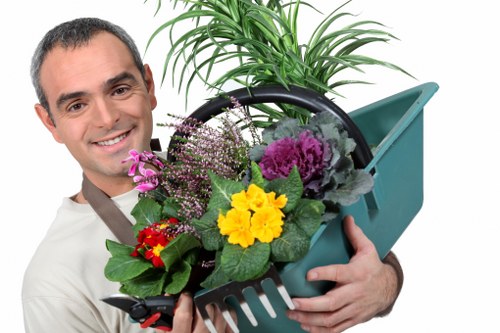
Pruning and Trimming
Regular pruning and trimming are essential for the health and aesthetics of your plants and shrubs. Proper pruning encourages growth, removes dead or diseased branches, and shapes plants for a neat appearance.
Pruning Techniques
Different plants require different pruning techniques. It's important to understand the specific needs of each plant in your garden to ensure effective maintenance.
Types of Pruning
- Thinning: Removing entire branches to improve air circulation and reduce overcrowding.
- Heading: Cutting back branches to promote bushier growth.
- Deadheading: Removing spent flowers to encourage new blooms.
Consistent pruning not only enhances the appearance of your garden but also promotes the overall health of your plants.
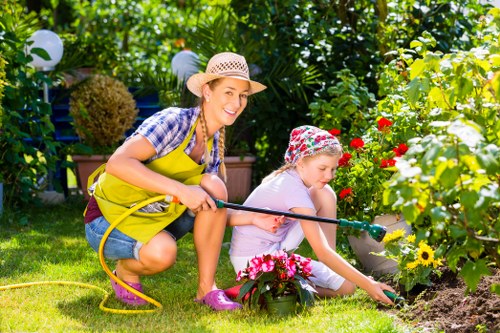
Weed Control and Management
Weeds can quickly take over a garden, competing with your plants for nutrients, water, and sunlight. Effective weed control is crucial for maintaining a pristine garden environment.
Organic vs. Chemical Weed Control
There are various methods to manage weeds, including organic solutions like mulching and manual removal, as well as chemical herbicides. Choosing the right approach depends on your garden's specific needs and your personal preferences.
Preventative Measures
- Mulching: Applying a layer of mulch suppresses weed growth by blocking sunlight.
- Regular Weeding: Consistently removing weeds prevents them from establishing a strong presence.
- Proper Plant Spacing: Ensuring adequate spacing reduces the likelihood of weeds taking hold.
Implementing these strategies will help keep your garden weed-free and your plants thriving.
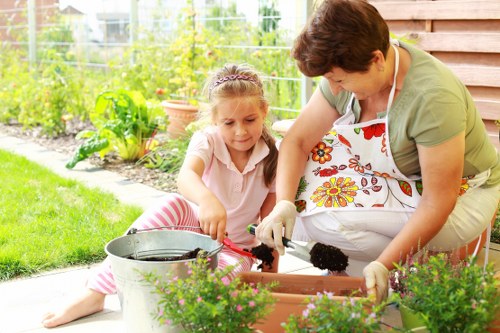
Soil Health and Fertilization
Healthy soil is the foundation of a vibrant garden. Ensuring your soil has the right balance of nutrients and proper structure is essential for plant growth.
Soil Testing and Amendment
Conducting regular soil tests helps determine the nutrient levels and pH balance of your garden soil. Based on the results, you can amend the soil with appropriate fertilizers or organic matter to enhance its fertility.
Types of Fertilizers
- Organic Fertilizers: Compost, manure, and bone meal enrich the soil naturally.
- Synthetic Fertilizers: Provide a quick boost of nutrients but should be used judiciously.
- Slow-Release Fertilizers: Offer a steady supply of nutrients over time, reducing the risk of over-fertilization.
Maintaining soil health through proper fertilization ensures your plants have the necessary nutrients to grow strong and resilient.

Irrigation and Water Management
Efficient irrigation is critical in garden maintenance, especially in areas like Putney where weather patterns can vary.
Types of Irrigation Systems
Choosing the right irrigation system can save water and ensure your plants receive consistent moisture.
Common Irrigation Methods
- Drip Irrigation: Delivers water directly to the plant roots, minimizing evaporation and water waste.
- Sprinkler Systems: Ideal for covering larger areas but may lead to higher water usage.
- Hand Watering: Allows for precise control but can be time-consuming for larger gardens.
Selecting an appropriate irrigation method based on your garden size and plant types contributes to effective water management.

Pest and Disease Management
Protecting your garden from pests and diseases is an ongoing challenge that requires vigilance and proactive strategies.
Identifying Common Pests
Understanding the common pests in Putney can help you address issues before they escalate.
Effective Pest Control Methods
- Natural Predators: Encouraging beneficial insects like ladybugs can naturally reduce pest populations.
- Organic Pesticides: Utilize environmentally friendly options to manage pests without harming beneficial organisms.
- Cultural Practices: Crop rotation and proper spacing can prevent the spread of pests and diseases.
Implementing a combination of these methods ensures a healthy and pest-free garden.

Seasonal Garden Maintenance
Each season brings its own set of challenges and tasks for garden maintenance in Putney. Adapting your maintenance routine to the changing seasons ensures your garden remains healthy and beautiful all year round.
Spring Maintenance
Spring is the perfect time to prepare your garden for the growing season. Tasks include pruning, soil preparation, and planting new flowers and shrubs.
Key Spring Tasks
- Clearing Debris: Remove fallen leaves and dead plants to make way for new growth.
- Soil Enrichment: Add compost or other organic matter to improve soil fertility.
- Planting: Introduce new plants that are well-suited to Putney's climate.
By addressing these tasks, you set the foundation for a thriving garden throughout the warmer months.

Hiring Professional Garden Maintenance Services in Putney
While DIY garden maintenance is rewarding, hiring professional services can save you time and ensure expert care for your garden.
Benefits of Professional Maintenance
Professional gardeners bring experience, knowledge, and specialized equipment to handle complex tasks efficiently.
Services Offered
- Lawn Care: Mowing, fertilizing, and aeration services to keep your lawn in top condition.
- Pruning and Trimming: Expert pruning to maintain plant health and garden aesthetics.
- Weed Control: Effective strategies to manage and prevent weed growth.
- Soil Management: Soil testing and fertilization services to enhance soil fertility.
Choosing a reputable garden maintenance service in Putney ensures your garden receives the best possible care.

Choosing the Right Plants for Putney Gardens
Selecting plants that are well-suited to Putney's climate and soil conditions is crucial for a thriving garden. Opting for native and drought-resistant species can reduce maintenance efforts and enhance the garden's resilience.
Top Plant Choices
Consider the following plants that perform well in Putney:
Flowering Plants
- Roses: Classic and versatile, roses add color and fragrance.
- Lavender: Drought-resistant and attracts pollinators.
- Peonies: Long-lasting blooms and low maintenance.
Shrubs and Trees
- Boxwood: Ideal for hedges and topiary.
- Japanese Maple: Adds visual interest with its unique foliage.
- Hawthorn: Provides structure and attracts wildlife.
Choosing the right plants enhances the beauty and functionality of your garden while minimizing maintenance requirements.

Maintaining Garden Structures
Garden structures like sheds, fences, and pergolas not only add aesthetic value but also provide functionality. Regular maintenance ensures these structures remain in good condition and complement your garden.
Common Maintenance Practices
To keep garden structures sturdy and attractive, consider the following practices:
Cleaning and Repairs
- Power Washing: Remove dirt and debris from surfaces.
- Inspecting for Damage: Regularly check for cracks, rot, or other issues.
- Repainting or Sealing: Protect surfaces from weather damage.
Consistent upkeep of garden structures ensures their longevity and maintains the overall appearance of your garden.
Eco-Friendly Garden Maintenance
Adopting eco-friendly practices in garden maintenance promotes sustainability and reduces environmental impact. Implementing green techniques benefits both your garden and the broader ecosystem.
Sustainable Practices
Consider the following eco-friendly maintenance methods:
Composting
- Benefits: Reduces waste and enriches soil with organic matter.
- How to Start: Set up a compost bin and regularly add kitchen scraps and garden waste.
Rainwater Harvesting
- Benefits: Conserves water and provides a free source for irrigation.
- Implementation: Install rain barrels to collect runoff from roofs.
Incorporating these sustainable practices enhances the health of your garden while supporting environmental conservation.
Conclusion
Effective garden maintenance in Putney involves a combination of regular tasks, seasonal adjustments, and informed decisions about plant selection and care methods. By following the strategies outlined in this article, you can cultivate a beautiful, healthy, and sustainable garden that serves as a peaceful retreat and a source of pride.
Whether you choose to undertake garden maintenance yourself or enlist the help of professional services, the key is consistency and attention to detail. Embrace the joys of gardening and watch your outdoor space flourish.
Contact us today to learn more about our professional garden maintenance services in Putney and take the first step towards achieving your dream garden.